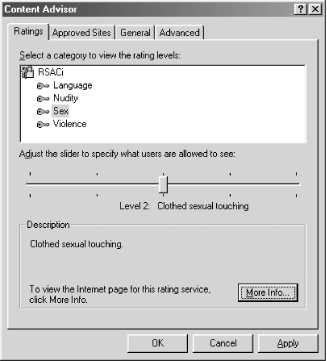23.3 RSACi
| only for RuBoard - do not distribute or recompile |
23.3 RSACi
The Recreational Software Advisory Council (RSAC) was formed in the mid-1990s in response to several moves within the U.S. Congress to regulate the content of children's video games. Congress was moved to action after a number of video games were produced in which the goal of the game was to brutally murder live-action figures, some of whom were wearing only the scantiest of outfits.[9] The entertainment industry successfully argued that it could police itself and offered to adopt a voluntary rating system that would let people purchasing a video game determine the levels of gore, violence, and sex that the program contained.
[9] It has been noted that if the officials were really concerned with the violence, they wouldn't care or need to mention what the characters were (not) wearing.
In conjunction with the development of the PICS standard, the World Wide Web Consortium worked with RSAC to develop a modified version of the RSAC rating system RSACi. Despite the fact that this rating system was designed for rating web sites and was created by the W3C, it still read like a rating system for video games and not for web sites. For example, a web site could be said to "reward injuring nonthreatening creatures."
Table 23-1 shows the RSAC ratings that are implemented in Microsoft Internet Explorer 3 and above. Microsoft's Internet Preferences panel is designed to allow parents to create "content advisors" that will prohibit the display of certain kinds of content. Figure 23-2 shows a window from the content advisor. In this case, the content advisor is loaded with the RSACi content rating system. The browser has been configured so that web pages containing any level of sexual activity may be displayed.
The content advisor can be password-protected, so that it cannot be changed or overridden except by an authorized user.
| Rating | Description |
|---|---|
| Language : | |
| Inoffensive slang | Inoffensive slang; no profanity |
| Mild expletives | Mild terms for body functions |
| Moderate expletives | Expletives; nonsexual anatomical reference |
| Obscene gestures | Strong, vulgar language; obscene gestures; use of epithets |
| Explicit or crude language | Extreme hate speech or crude language; explicit sexual references |
| Nudity : | |
| None | No nudity |
| Revealing attire | Revealing attire |
| Partial nudity | Partial nudity |
| Frontal nudity | Frontal nudity |
| Provocative display of frontal nudity | Provocative frontal nudity; explicit sexual activity; sex crimes |
| Sex : | |
| None | No sexual activity portrayed; romance |
| Passionate kissing | Passionate kissing |
| Clothed sexual touching | Clothed sexual touching |
| Nonexplicit sexual touching | Nonexplicit sexual touching |
| Explicit sexual activity | Explicit sexual activity; sex crimes |
| Violence : | |
| No violence | No aggressive violence; no natural or accidental violence |
| Fighting | Creatures injured or killed; damage to realistic objects |
| Killing | Humans or creatures injured or killed; rewards injuring nonthreatening creatures |
| Killing with blood and gore | Humans injured or killed |
| Wanton and gratuitous violence | Wanton and gratuitous violence; torture; rape |
Figure 23-2. Internet Explorer's Content Advisor uses RSACi to allow users to select the maximum permissible rating for each web page that is downloaded.

Internet Explorer's content advisor is not foolproof: it is possible for a skilled user to override the system by deleting key files on a Windows system and reinstalling any necessary software. Additionally, a user can simply download a web browser that does not implement the content controls, such as Netscape Navigator.
| only for RuBoard - do not distribute or recompile |
EAN: 2147483647
Pages: 194